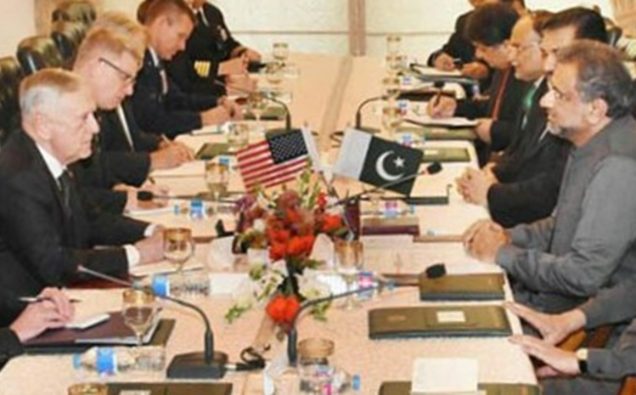
Pakistan’s Prime Minister Shahid Khaqan Abbasi has urged President Donald Trump to see commonality of interests that both countries have in the fight against terror, asking Washington to frame its policy toward Islamabad on the basis of realities instead of perceptions.
“My message would be to look at Pakistan’s viewpoint. The reality of Pakistan is very different from the perception he has. Pakistan is a U.S. ally. It is a partner against the same enemy, which is terror,” Abbasi told The Washington Post in an interview when asked about his message for President Trump.
Abbasi spoke to the Post in an interview as the United States and Pakistan grapple with tensions in the relationship, revolving around U.S. accusations that Pakistan provides sanctuary to the Afghan Taliban and Islamabad’s opposition to the new U.S. policy toward Afghanistan.
In the latest spat between the two longtime allies, U.S. and Pakistan publicly expressed differences over a drone strike that reportedly targeted Haqqani network militants trying to hide among Afghan refugees on the Pakistani side of the restive border.
The U.S. has also suspended security assistance for Pakistan, whose role is considered key to Afghan quest for stability. The tensions flared up following President Trump’s New Year tweet that alleged Pakistan had been deceitful in its dealings with the United States.
Islamabad has strongly rejected the charges of providing sanctuary to any Afghan militants and instead points to inability of Afghans to improve their governance as well as flaws in the U.S. policy that has failed to deliver in the 17-year-old war.
During the interview conducted in Davos, Switzerland on the margins of the World Economic Forum, Prime Minister Abbasi said Pakistan continues to provide key supplies routes to the United States, and said it is not likely to be affected by President Trump’s tweet.
“No. That will continue. Because we believe that helps in the war against terror. It helps bring stability to Pakistan, so we support that effort. We have taken our territory back. We have destroyed the sanctuaries.”
He said, there are no (mililtant) sanctuaries in Pakistan.
“If someone provides us with a location, we take action against that.”
On the deteriorating situation in Afghanistan, Abbasi said the reality is that most of the area that borders Pakistan is controlled by the Taliban.
“The (Afghan) government has minimal control there. There is a 2,000-plus-kilometer border with Afghanistan. I can tell you that in 700 of those kilometers there is not a single Afghan soldier or a post. Drug trafficking is at the highest level we have seen in 50 years. They cross over the border from Afghanistan into Pakistan. We have now started fencing the border on our side. We are spending billions of dollars fencing the border.”
Pakistan, he said, is doing its part to curb militancy.
“We are trying to keep the drugs out, the terrorists out. It is a fluid border: 60 to 70 thousand undocumented people cross the border every day.”
He told the newspaper that “war is not a solution in Afghanistan. The Afghans have to sit down and resolve their problems.”

















